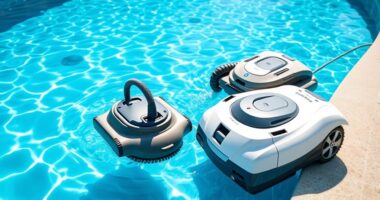To care for your pressure pool cleaner during the off-season, start by inspecting all parts for wear, cracks, or damage, and replace worn components. Clean and dry everything thoroughly before storage, disconnect and drain hoses, and store in a dry, cool place away from sunlight. Follow manufacturer guidelines for proper maintenance and make certain everything is secure. If you want to keep your cleaner in top shape until next season, there’s more to learn about ideal storage practices.
Key Takeaways
- Thoroughly clean and dry all parts, hoses, and filters before storage.
- Disconnect hoses, drain and coil them loosely to prevent damage or freezing.
- Store the cleaner in a dry, cool, and protected environment away from sunlight.
- Check for wear or damage, replace worn parts, and lubricate moving components as recommended.
- Conduct a quick reassembly and test run before resuming use in the next season.

As the swimming season winds down, properly caring for your pressure pool cleaner during the off-season is vital to guarantee it stays in good condition and is ready to go when you need it again. Preparing your cleaner for winter storage helps prevent damage and assures longevity. Start by thoroughly inspecting your cleaner for any signs of wear or damage. Check hoses, brushes, and fittings, and replace any worn or cracked parts. This proactive step avoids surprises when you’re ready to reopen the pool. Before storing, give your cleaner a complete cleaning to remove dirt, debris, and chemical residues that can cause deterioration over time.
Properly inspect and clean your pressure pool cleaner before winter to ensure longevity and readiness for the next season.
Once cleaned, it’s essential to dry your pressure pool cleaner thoroughly. Moisture can lead to mold, mildew, or corrosion, especially during cold months when you’re not using it. Wipe down all parts with a dry cloth and allow everything to air dry completely. For hoses, consider disconnecting and draining any water to prevent freezing and cracking. It’s a good idea to coiled hoses loosely to avoid kinks or damage, but avoid tight bends that can cause cracks over time. Additionally, storing the cleaner in a dry, protected environment helps prevent exposure to environmental elements that could accelerate wear. Proper storage techniques also help maintain the integrity of pressure systems, ensuring optimal performance when you resume use. Using appropriate storage containers can further shield your equipment from dust and moisture.
Storing the cleaner properly also involves checking for manufacturer-specific recommendations to ensure you follow best practices for your particular model. When it comes to winter storage, find a cool, dry place away from direct sunlight and extreme temperatures. Excessive heat can degrade plastic components, while freezing temperatures might damage hoses or internal parts. A basement, garage, or shed generally works well, provided it maintains a stable environment. During this time, follow specific maintenance tips—such as lubricating moving parts with a suitable lubricant to prevent rust and ensuring that all connections are secure. If your model has a filter or other replaceable parts, consider removing and storing them separately in a sealed bag to keep dust and moisture away.
Additionally, this is a good opportunity to review your user manual for any manufacturer-specific winter storage instructions. Some cleaners may have particular recommendations for off-season care. When storing the cleaner, avoid placing heavy objects on top of it to prevent warping or damage. Also, keep the cleaner out of reach of children and pets to avoid accidental damage. On start-up, once the season begins again, inspect the equipment, reassemble if necessary, and give everything a quick test run to ensure it’s functioning correctly. Proper winter storage not only extends the life of your pressure pool cleaner but also ensures it operates efficiently when you need it most. Properly storing your pressure pool cleaner is an essential part of ensuring your pool stays in top condition year-round, avoiding costly repairs and downtime.
Frequently Asked Questions
Can Pressure Pool Cleaners Be Stored Outdoors During Winter?
You might wonder if you can leave your pressure pool cleaner outdoors during winter. While outdoor storage is possible, you need to guarantee proper winter protection. Make sure it’s stored in a sheltered, dry spot away from harsh weather. Clean it thoroughly first, and consider covering it with a waterproof tarp. Taking these steps helps prevent damage and keeps your cleaner in good shape for the next season.
How Often Should I Run a Pressure Cleaner Before Off-Season Storage?
Did you know that regular maintenance can extend your pressure cleaner’s lifespan by up to 30%? Before storage, you should run your pressure cleaner for about 10-15 minutes weekly to keep it in good shape. Follow a proper maintenance schedule and focus on storage preparation by cleaning and draining it thoroughly. This routine guarantees your cleaner stays ready for use whenever you need it, avoiding costly repairs later.
Is It Necessary to Replace Parts Before Storing the Cleaner?
You might need part replacement before storage to guarantee your pressure pool cleaner functions well later. Check for worn or cracked seals, hoses, or o-rings, and replace any damaged parts. Proper storage preparation involves inspecting and replacing parts as needed, preventing potential issues. Doing this helps avoid costly repairs when you reopen your pool, ensuring your cleaner stays in top shape and ready to work when the season starts again.
What Type of Cover Is Best for Protecting the Cleaner?
This is the most important question you’ll ask—all pool cover types matter, but protective covers truly save the day! The best cover for your pressure pool cleaner is a durable, weather-resistant one, like a heavy-duty vinyl or a tarp-style cover. These protect against debris, UV rays, and moisture, keeping your cleaner in top shape. Invest in a quality cover, and you’ll extend your cleaner’s lifespan far beyond expectations.
Can Pressure Pool Cleaners Be Used in Saltwater Pools During Off-Season?
You can use pressure pool cleaners in saltwater pools during the off-season if they’re saltwater compatible. Check your cleaner’s specifications to confirm corrosion prevention features are in place, as saltwater can cause damage over time. Regularly rinse the cleaner with fresh water after use, and store it properly to minimize corrosion. Proper maintenance helps extend your cleaner’s lifespan and keeps it functioning efficiently in saltwater environments.
Conclusion
Think of your pressure pool cleaner as a trusty steed awaiting its next adventure. When the season’s over, give it a gentle rest and proper care, so it’s ready to gallop back into action when summer returns. Just like tending to a loyal companion, your attention now ensures it’ll be strong and enthusiastic for many more pool days ahead. With a little care, your cleaner will be your faithful helper for seasons to come.









